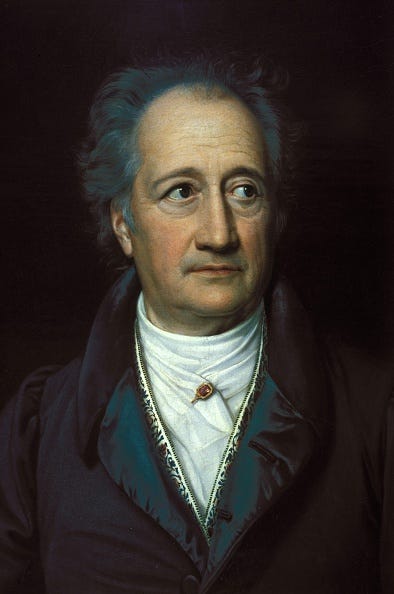The Writer's Almanac from Wednesday, August 28, 2013
"Song of Smoke" by Kevin Young, from Jelly Roll. © Knopf, 2003.
ORIGINAL TEXT AND AUDIO - 2013
It's the birthday of the father of German literature, Johann Wolfgang von Goethe, born in Frankfurt, Germany (1749), the author of the epic drama Faust.
He moved to Italy in 1786, and when he returned to Germany two years later, he fell in love with a woman from Weimer, Christiane Vulpius, a 23-year-old who was 16 years his junior. That year, he wrote her an epithalamium, a wedding poem, but he didn't actually marry her; instead, the couple lived together for 18 years unwed. That is, until one night, Christiane saved Goethe's life by driving off a band of Napoleon's soldiers who had broken in their home. Goethe went down to a church the very next day and married her, his live-in girlfriend of 18 years.
In 1806, the same year of the home invasion and marriage, Goethe published a preliminary version of Part I of his great work, Faust, the story of a brilliant scholar named Heinrich Faust, who makes a deal with the devil. The great epic has it all: seduction, murder, sleeping potions, an illegitimate love child, a stray poodle that transforms into the devil, contracts signed with blood, imprisonment in dungeons, heavenly voices, and even redemption. Faust is often called a "closet drama" because it's intended to be read, not performed. Goethe spent 50 years working on this two-volume masterpiece, finishing it in 1832, the year of his death.
Christiane survived for only a decade after her and Goethe's wedding. In later life, after recovering from a heart disease that nearly killed him, the 73-year-old Goethe fell passionately in love with an 18-year-old woman, Ulrike von Levetzow, and was devastated when she turned down his proposals of marriage.
Goethe, who said, "One ought, every day at least, to hear a little song, read a good poem, see a fine picture, and if it were possible, to speak a few reasonable words."
It's the birthday of poet Rita Dove, born in Akron, Ohio (1952). Her father had a master's degree in chemistry but had to work as an elevator operator because he was black. He eventually became the first African-American chemist to work for Goodyear Tires.
He encouraged his daughter to take advantage of education, and she was at the top of her class. She was chosen as one of 100 of the best high school students in the country to visit the president of the United States. Her parents assumed that she would go on to become a doctor or lawyer, so when she announced that she wanted to be a poet, they weren't sure what to make of it. She said, "[My father] swallowed once and said, 'Well, I've never understood poetry, so don't be upset if I don't read it.'" Her teachers at college told her that she was throwing her education away if she didn't study something more practical.
But with her poetry collection Thomas and Beulah (1986), based loosely on the lives of her grandparents, she became only the second African-American to win the Pulitzer Prize for poetry, and she went on to become the first African-American national poet laureate.
Be well, do good work, and keep in touch.®
Cheerfulness by Garrison Keillor
In Cheerfulness, veteran radio host and author Garrison Keillor reflects on a simple virtue that can help us in this stressful and sometimes gloomy era. Drawing on personal anecdotes from his young adulthood into his eighties, Keillor sheds light on the immense good that can come from a deliberate work ethic and a buoyant demeanor.





